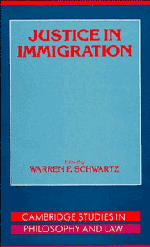Book contents
- Frontmatter
- Contents
- List of contributors
- 1 Immigration, welfare, and justice
- 2 Citizenship, the demands of justice, and the moral relevance of political borders
- 3 A two-country parable
- 4 Immigration, identity, and justice
- 5 Immigration, justice, and culture
- 6 Fear and loathing at the border
- 7 Immigration policy in liberal political theory
- 8 The welfare economics of immigration law: a theoretical survey with an analysis of U.S. policy
- 9 Just borders: normative economics and immigration law
- 10 Some caveats on the welfare economics of immigration law
- 11 The case for a liberal immigration policy
3 - A two-country parable
Published online by Cambridge University Press: 18 March 2010
- Frontmatter
- Contents
- List of contributors
- 1 Immigration, welfare, and justice
- 2 Citizenship, the demands of justice, and the moral relevance of political borders
- 3 A two-country parable
- 4 Immigration, identity, and justice
- 5 Immigration, justice, and culture
- 6 Fear and loathing at the border
- 7 Immigration policy in liberal political theory
- 8 The welfare economics of immigration law: a theoretical survey with an analysis of U.S. policy
- 9 Just borders: normative economics and immigration law
- 10 Some caveats on the welfare economics of immigration law
- 11 The case for a liberal immigration policy
Summary
Consider a conceptual experiment. There are two physically separated locational units (call them “countries”) that are descriptively identical and also are inhabited initially by equal numbers of humans, who are possessed of identical potential capacities. Throughout the historical period to be considered, there is no economic relationship between inhabitants of the two countries that extend across boundaries. Each unit exists in autarky.
Over some period of time, one of the two countries, call it A, either through an evolutionary process not well understood or through deliberative design and construction of constitutional constraints, comes to be organized in such a fashion that facilitates the production (and potential consumption) of a relatively high level of economic value (as determined by the preferences of inhabitants) and also facilitates relatively high increases in this level of value through time. By comparison, the other country, call it B, although initially equally endowed, does not experience a similar evolution and/or does not undergo a process of successful design and construction of constitutional parameters, effective as measured by the potential for facilitating the generation and growth of economic value. As a result of these disparate histories, the economy of country B produces a relatively low level of value, as measured by the preferences of its inhabitants, and this level increases relatively slowly through time, if at all.
In simpler terms, no matter where he or she is situated positionally within a country, the life of an inhabitant differs substantially between the two separated countries.
- Type
- Chapter
- Information
- Justice in Immigration , pp. 63 - 66Publisher: Cambridge University PressPrint publication year: 1995
- 3
- Cited by



